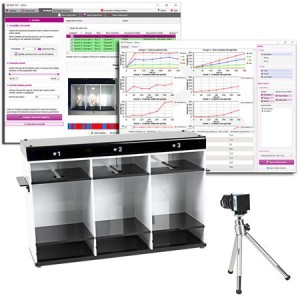Authors
M.A. Vogt, S. Chourbaji, C. Brandwein, C. Dormann, R. Sprengel et al.
Lab
University of Heidelberg, Central Institute of Mental Health Mannheim, Mannheim, Germany.
Journal
Experimental Neurology
Abstract
Tamoxifen-induced mutagenesis via the so-called CreERT2 fusion enzyme is a key technology for the inducible gene knockout in the adult murine brain. However, it requires a subchronic transient treatment with high doses of the non-selective estrogen receptor antagonist tamoxifen. It has been shown earlier that acute tamoxifen treatment causes behavioral alterations, while the long-term behavioral effects of tamoxifen in mice are so far unknown. Therefore C57BL/6 male mice, a common strain used for targeted mutagenesis and behavioral analyses, were subjected to a tamoxifen treatment protocol as used for inducible mutagenesis in vivo, and analyzed for effects on general behavior (locomotion, exploration), emotional behavior (anxiety, depression) and on learning and memory after a drug-free interval period of 4 weeks. The results demonstrate that a test for depression-like behavior, i.e. the Forced Swim Test, is affected even more than 4 weeks after tamoxifen treatment. In contrast, in all other tests, tamoxifen treated mice showed unaltered behaviors, indicating that the currently established 5-day protocol of tamoxifen treatment (40 mg/kg bid) for inducible mutagenesis has no or little effects on the behavior of C57BL/6 male mice after a latency period of 4 weeks. These results are important for all studies using tamoxifen-induced mutagenesis since this protocol obviously does not evoke alterations in general behaviors such as locomotion, exploration or anxiety-like behaviors, which might confound more complex behavioral analyses, nor does it affect standard tests for learning and memory, such as Morris Water Maze, contextual and cued Fear Conditioning and T-Maze learning.
BIOSEB Instruments Used
Tail Suspension Test - Wireless (BIO-TST5)
Source :
http://www.sciencedirect.com/science/article/pii/S0014488607004517

 Pain - Thermal Allodynia / Hyperalgesia
Pain - Thermal Allodynia / Hyperalgesia Pain - Spontaneous Pain - Postural Deficit
Pain - Spontaneous Pain - Postural Deficit Pain - Mechanical Allodynia / Hyperalgesia
Pain - Mechanical Allodynia / Hyperalgesia Learning/Memory - Attention - Addiction
Learning/Memory - Attention - Addiction Physiology & Respiratory Research
Physiology & Respiratory Research











![Dynamic Weight Bearing 2.0 – Postural Module [Add-on]](https://bioseb.com/733-home_default/dynamic-weight-bearing-20-add-on-postural-module.jpg)
























 Pain
Pain Central Nervous System (CNS)
Central Nervous System (CNS) Neurodegeneration
Neurodegeneration Sensory system
Sensory system Motor control
Motor control Mood Disorders
Mood Disorders Other disorders
Other disorders Muscular system
Muscular system Joints
Joints Metabolism
Metabolism Cross-disciplinary subjects
Cross-disciplinary subjects CONFERENCES & MEETINGS
CONFERENCES & MEETINGS 